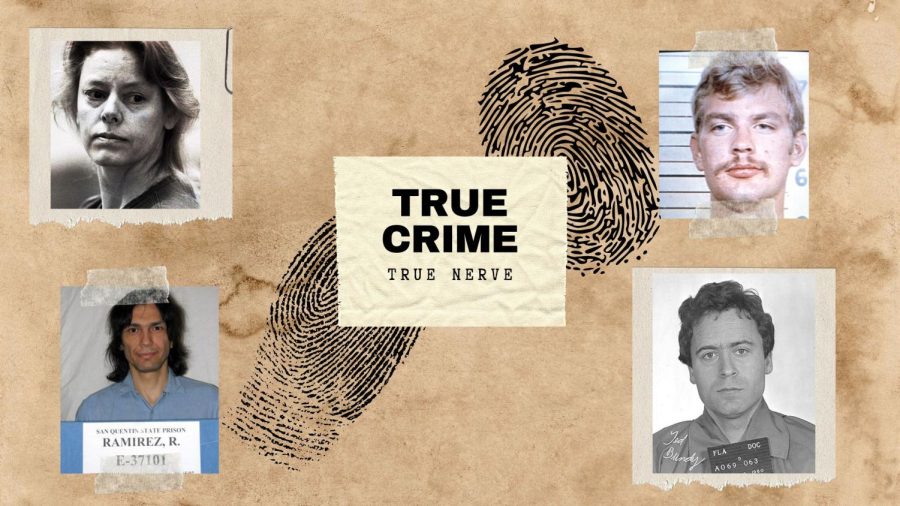True crime, true nerve
While the macabre has intrigued humanity for millennia, the time between the viewings of executions and gore has extended far beyond the current day and age. True crime, a fan favorite of dozens, surfaces as an outlet for individuals to take an insight into their fears through peculiar exposure therapy. However, the extent to which the obsession has manifested pushes the boundaries of sanity and respect. From profiting off of victims’ traumas to desensitizing the masses to horrendous crimes, true crime needs a true time-out.
November 2, 2022
Cold case podcasts, murder novels and even the old whodunnits of the ‘60s embody people’s inherent fascination with the dark, gruesome and macabre. One in three Americans consume content within the true crime genre, with half of those surveyed claiming the topic reigns as one of their top favorites; well-enough reason reinforces the high amount of support. People like chaos; simply taking a quick glimpse into history, one can find numerous cases of individuals creating tailgating-like events to executions and paying hundreds to literally watch a trainwreck, all the while complaining about the lack of blood, viscera and gore.
Additionally, curiosity inherently drives people. Think of the age-old Latin phrase “Cogito Ergo Sum”: I think, therefore I am. Another statistic that circles around in the true crime community remains that middle-aged women typically represent the bulk of the fandom. Behavioral psychologists have theorized this may stem from their place in society; an overwhelming number of serial killers’ victims identified as female. Especially considering during the ‘70s to late ‘00s bear the largest amount of time notorious killer activity, growing up in decades of fear could have sparked an interest in the threat ubiquitous in their lives.
Nevertheless, the circumstances do not excuse the lack of empathy given toward the genre. True crime’s downfall to existing in a vacuum exists within its name: true. Real, living, breathing, loving, feeling people died at the hands of individuals horrendous enough to send shivers down the spines of fictional monsters. There lies a major situational irony in the case of true crime: for a bunch of people who grew up during those decades of terror, they cannot understand that the romanization could lead pain to those involved.
While a popular genre within its usual boundaries, true crime has soared far beyond the average aficionado’s radar following the release of Netflix’s original documentary, “Dahmer”. Shooting to the top viewed show in the business’s history in a mere couple of days, this tired, worn-out trope unfortunately reignited debate and attention onto horrible people. Equally horrifying remains the sheer lack of sensitivity or awareness newer fans hold. Mother of an aspiring actor and unfortunate victim Tony Hughes, Shirley Hughes, has condemned the network, begging the question as to why they would re-invoke uncomfortable conversations and intrigue onto a man long since dead. Hughes does not stand alone in her opinion.
“Honestly, I feel like true crime is interesting. I definitely understand where people are coming from when they have such an interest in it. But especially when it’s become such a popular thing. It seems disrespectful to the victims and their families; even when people make YouTube videos about this kind of stuff, ‘are they in contact with the victim’s family?’ ‘Are they okay with this kind of stuff going on?’ And the sheer amount of profit that they’re making off of these videos, is any of it even going to the family? Most of the time, it’s just them profiting off of someone’s brutal murder,” magnet senior Harmony Toner said.
On the other hand, certain individuals argue these obsessions do not truly harm victims and their families, considering the events, as heartbreaking as they can appear, already happened. Costumes and fun memorabilia serve as grim, but lighthearted, reminders never to forget the horrors the perpetrators committed. However, considering that finances, insensitivity and romanization frequently intertwine within the world of true crime, those arguments weakly hold together their stubbornness for empathy.
“With the fandoms and stuff like that, I’m not surprised that that’s a thing. But that doesn’t take away from the fact that that’s not a good thing. It’s really mind-boggling how much people can romanticize such terrible crimes. I feel like no one’s focusing on the fact that these people are terrible people and they committed very brutal crimes! It’s [true crime] overly romanticized, it shouldn’t be happening at all, and not enough people are talking about it,” Toner said.







